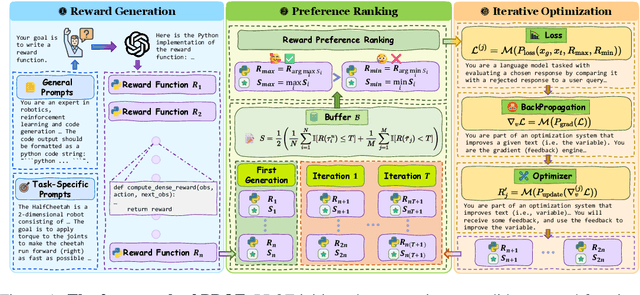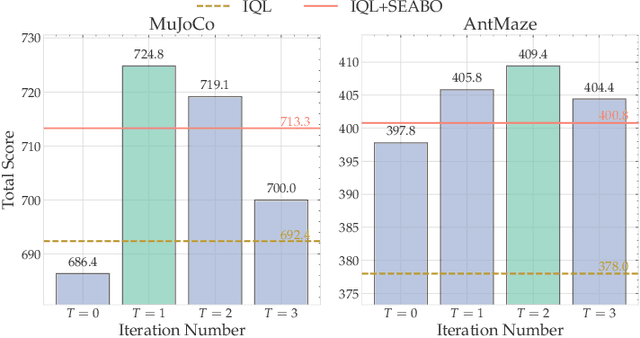Deheng Ye
Tencent Inc
ProAct: Agentic Lookahead in Interactive Environments
Feb 05, 2026Abstract:Existing Large Language Model (LLM) agents struggle in interactive environments requiring long-horizon planning, primarily due to compounding errors when simulating future states. To address this, we propose ProAct, a framework that enables agents to internalize accurate lookahead reasoning through a two-stage training paradigm. First, we introduce Grounded LookAhead Distillation (GLAD), where the agent undergoes supervised fine-tuning on trajectories derived from environment-based search. By compressing complex search trees into concise, causal reasoning chains, the agent learns the logic of foresight without the computational overhead of inference-time search. Second, to further refine decision accuracy, we propose the Monte-Carlo Critic (MC-Critic), a plug-and-play auxiliary value estimator designed to enhance policy-gradient algorithms like PPO and GRPO. By leveraging lightweight environment rollouts to calibrate value estimates, MC-Critic provides a low-variance signal that facilitates stable policy optimization without relying on expensive model-based value approximation. Experiments on both stochastic (e.g., 2048) and deterministic (e.g., Sokoban) environments demonstrate that ProAct significantly improves planning accuracy. Notably, a 4B parameter model trained with ProAct outperforms all open-source baselines and rivals state-of-the-art closed-source models, while demonstrating robust generalization to unseen environments. The codes and models are available at https://github.com/GreatX3/ProAct
Cross-Domain Offline Policy Adaptation via Selective Transition Correction
Feb 05, 2026Abstract:It remains a critical challenge to adapt policies across domains with mismatched dynamics in reinforcement learning (RL). In this paper, we study cross-domain offline RL, where an offline dataset from another similar source domain can be accessed to enhance policy learning upon a target domain dataset. Directly merging the two datasets may lead to suboptimal performance due to potential dynamics mismatches. Existing approaches typically mitigate this issue through source domain transition filtering or reward modification, which, however, may lead to insufficient exploitation of the valuable source domain data. Instead, we propose to modify the source domain data into the target domain data. To that end, we leverage an inverse policy model and a reward model to correct the actions and rewards of source transitions, explicitly achieving alignment with the target dynamics. Since limited data may result in inaccurate model training, we further employ a forward dynamics model to retain corrected samples that better match the target dynamics than the original transitions. Consequently, we propose the Selective Transition Correction (STC) algorithm, which enables reliable usage of source domain data for policy adaptation. Experiments on various environments with dynamics shifts demonstrate that STC achieves superior performance against existing baselines.
PIPCFR: Pseudo-outcome Imputation with Post-treatment Variables for Individual Treatment Effect Estimation
Dec 21, 2025Abstract:The estimation of individual treatment effects (ITE) focuses on predicting the outcome changes that result from a change in treatment. A fundamental challenge in observational data is that while we need to infer outcome differences under alternative treatments, we can only observe each individual's outcome under a single treatment. Existing approaches address this limitation either by training with inferred pseudo-outcomes or by creating matched instance pairs. However, recent work has largely overlooked the potential impact of post-treatment variables on the outcome. This oversight prevents existing methods from fully capturing outcome variability, resulting in increased variance in counterfactual predictions. This paper introduces Pseudo-outcome Imputation with Post-treatment Variables for Counterfactual Regression (PIPCFR), a novel approach that incorporates post-treatment variables to improve pseudo-outcome imputation. We analyze the challenges inherent in utilizing post-treatment variables and establish a novel theoretical bound for ITE risk that explicitly connects post-treatment variables to ITE estimation accuracy. Unlike existing methods that ignore these variables or impose restrictive assumptions, PIPCFR learns effective representations that preserve informative components while mitigating bias. Empirical evaluations on both real-world and simulated datasets demonstrate that PIPCFR achieves significantly lower ITE errors compared to existing methods.
GTR-Turbo: Merged Checkpoint is Secretly a Free Teacher for Agentic VLM Training
Dec 15, 2025Abstract:Multi-turn reinforcement learning (RL) for multi-modal agents built upon vision-language models (VLMs) is hampered by sparse rewards and long-horizon credit assignment. Recent methods densify the reward by querying a teacher that provides step-level feedback, e.g., Guided Thought Reinforcement (GTR) and On-Policy Distillation, but rely on costly, often privileged models as the teacher, limiting practicality and reproducibility. We introduce GTR-Turbo, a highly efficient upgrade to GTR, which matches the performance without training or querying an expensive teacher model. Specifically, GTR-Turbo merges the weights of checkpoints produced during the ongoing RL training, and then uses this merged model as a "free" teacher to guide the subsequent RL via supervised fine-tuning or soft logit distillation. This design removes dependence on privileged VLMs (e.g., GPT or Gemini), mitigates the "entropy collapse" observed in prior work, and keeps training stable. Across diverse visual agentic tasks, GTR-Turbo improves the accuracy of the baseline model by 10-30% while reducing wall-clock training time by 50% and compute cost by 60% relative to GTR.
EntroPIC: Towards Stable Long-Term Training of LLMs via Entropy Stabilization with Proportional-Integral Control
Nov 19, 2025Abstract:Long-term training of large language models (LLMs) requires maintaining stable exploration to prevent the model from collapsing into sub-optimal behaviors. Entropy is crucial in this context, as it controls exploration and helps avoid premature convergence to sub-optimal solutions. However, existing reinforcement learning methods struggle to maintain an appropriate level of entropy, as the training process involves a mix of positive and negative samples, each affecting entropy in different ways across steps. To address this, we propose Entropy stablilization via Proportional-Integral Control (EntroPIC), a novel method that adaptively adjusts the influence of positive and negative samples by dynamically tuning their loss coefficients. This approach stabilizes entropy throughout training, ensuring efficient exploration and steady progress. We provide a comprehensive theoretical analysis for both on-policy and off-policy learning settings, demonstrating that EntroPIC is effective at controlling entropy in large-scale LLM training. Experimental results show that our method successfully maintains desired entropy levels, enabling stable and optimal RL training for LLMs.
PROF: An LLM-based Reward Code Preference Optimization Framework for Offline Imitation Learning
Nov 14, 2025



Abstract:Offline imitation learning (offline IL) enables training effective policies without requiring explicit reward annotations. Recent approaches attempt to estimate rewards for unlabeled datasets using a small set of expert demonstrations. However, these methods often assume that the similarity between a trajectory and an expert demonstration is positively correlated with the reward, which oversimplifies the underlying reward structure. We propose PROF, a novel framework that leverages large language models (LLMs) to generate and improve executable reward function codes from natural language descriptions and a single expert trajectory. We propose Reward Preference Ranking (RPR), a novel reward function quality assessment and ranking strategy without requiring environment interactions or RL training. RPR calculates the dominance scores of the reward functions, where higher scores indicate better alignment with expert preferences. By alternating between RPR and text-based gradient optimization, PROF fully automates the selection and refinement of optimal reward functions for downstream policy learning. Empirical results on D4RL demonstrate that PROF surpasses or matches recent strong baselines across numerous datasets and domains, highlighting the effectiveness of our approach.
Multi-agent In-context Coordination via Decentralized Memory Retrieval
Nov 13, 2025



Abstract:Large transformer models, trained on diverse datasets, have demonstrated impressive few-shot performance on previously unseen tasks without requiring parameter updates. This capability has also been explored in Reinforcement Learning (RL), where agents interact with the environment to retrieve context and maximize cumulative rewards, showcasing strong adaptability in complex settings. However, in cooperative Multi-Agent Reinforcement Learning (MARL), where agents must coordinate toward a shared goal, decentralized policy deployment can lead to mismatches in task alignment and reward assignment, limiting the efficiency of policy adaptation. To address this challenge, we introduce Multi-agent In-context Coordination via Decentralized Memory Retrieval (MAICC), a novel approach designed to enhance coordination by fast adaptation. Our method involves training a centralized embedding model to capture fine-grained trajectory representations, followed by decentralized models that approximate the centralized one to obtain team-level task information. Based on the learned embeddings, relevant trajectories are retrieved as context, which, combined with the agents' current sub-trajectories, inform decision-making. During decentralized execution, we introduce a novel memory mechanism that effectively balances test-time online data with offline memory. Based on the constructed memory, we propose a hybrid utility score that incorporates both individual- and team-level returns, ensuring credit assignment across agents. Extensive experiments on cooperative MARL benchmarks, including Level-Based Foraging (LBF) and SMAC (v1/v2), show that MAICC enables faster adaptation to unseen tasks compared to existing methods. Code is available at https://github.com/LAMDA-RL/MAICC.
Think Consistently, Reason Efficiently: Energy-Based Calibration for Implicit Chain-of-Thought
Nov 10, 2025Abstract:Large Language Models (LLMs) have demonstrated strong reasoning capabilities through \emph{Chain-of-Thought} (CoT) prompting, which enables step-by-step intermediate reasoning. However, explicit CoT methods rely on discrete token-level reasoning processes that are prone to error propagation and limited by vocabulary expressiveness, often resulting in rigid and inconsistent reasoning trajectories. Recent research has explored implicit or continuous reasoning in latent spaces, allowing models to perform internal reasoning before generating explicit output. Although such approaches alleviate some limitations of discrete CoT, they generally lack explicit mechanisms to enforce consistency among reasoning steps, leading to divergent reasoning paths and unstable outcomes. To address this issue, we propose EBM-CoT, an Energy-Based Chain-of-Thought Calibration framework that refines latent thought representations through an energy-based model (EBM). Our method dynamically adjusts latent reasoning trajectories toward lower-energy, high-consistency regions in the embedding space, improving both reasoning accuracy and consistency without modifying the base language model. Extensive experiments across mathematical, commonsense, and symbolic reasoning benchmarks demonstrate that the proposed framework significantly enhances the consistency and efficiency of multi-step reasoning in LLMs.
VistaWise: Building Cost-Effective Agent with Cross-Modal Knowledge Graph for Minecraft
Aug 26, 2025Abstract:Large language models (LLMs) have shown significant promise in embodied decision-making tasks within virtual open-world environments. Nonetheless, their performance is hindered by the absence of domain-specific knowledge. Methods that finetune on large-scale domain-specific data entail prohibitive development costs. This paper introduces VistaWise, a cost-effective agent framework that integrates cross-modal domain knowledge and finetunes a dedicated object detection model for visual analysis. It reduces the requirement for domain-specific training data from millions of samples to a few hundred. VistaWise integrates visual information and textual dependencies into a cross-modal knowledge graph (KG), enabling a comprehensive and accurate understanding of multimodal environments. We also equip the agent with a retrieval-based pooling strategy to extract task-related information from the KG, and a desktop-level skill library to support direct operation of the Minecraft desktop client via mouse and keyboard inputs. Experimental results demonstrate that VistaWise achieves state-of-the-art performance across various open-world tasks, highlighting its effectiveness in reducing development costs while enhancing agent performance.
CausalMACE: Causality Empowered Multi-Agents in Minecraft Cooperative Tasks
Aug 26, 2025Abstract:Minecraft, as an open-world virtual interactive environment, has become a prominent platform for research on agent decision-making and execution. Existing works primarily adopt a single Large Language Model (LLM) agent to complete various in-game tasks. However, for complex tasks requiring lengthy sequences of actions, single-agent approaches often face challenges related to inefficiency and limited fault tolerance. Despite these issues, research on multi-agent collaboration remains scarce. In this paper, we propose CausalMACE, a holistic causality planning framework designed to enhance multi-agent systems, in which we incorporate causality to manage dependencies among subtasks. Technically, our proposed framework introduces two modules: an overarching task graph for global task planning and a causality-based module for dependency management, where inherent rules are adopted to perform causal intervention. Experimental results demonstrate our approach achieves state-of-the-art performance in multi-agent cooperative tasks of Minecraft.
 Add to Chrome
Add to Chrome Add to Firefox
Add to Firefox Add to Edge
Add to Edge